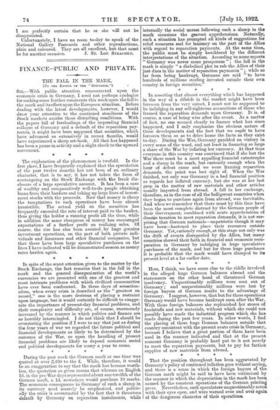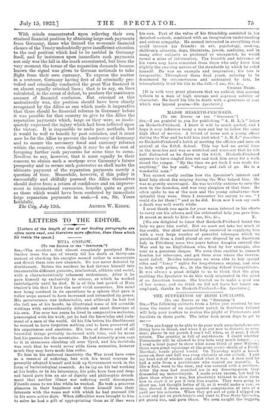FINANCE-PUBLIC AND PRIVATE.
THE FALL IN THE MARS.
[To THE EDITOR or THR "SPECTAT,OR."1 SIR,—With public attention concentrated upon the economic crisis in Germany, I need not perhaps apologize for making some further comments this week upon the fall in the mark and its effect upon the European situation. Before dealing with the latest developments, however, I would draw your attention to the continued steadiness of the Stock markets amidst these disturbing conditions. With the papers full of forebodings of the impending financial collapse of Germany and a default of the reparation pay- ments, it might have been supposed. that securities, which have advanced so extensively in recent Months, would have experienced a sharp set-back. All. that has happened has been a pause in activity and a. alight checkto the upward movement.
The explanation of the phenomenon is twofold. In the first place, I have frequently explained that the speculation of the past twelve months has not been of an ordinary character, that is to say, it has not taken the form of contangoing on the Stock Exchange with the frank dis- closure of a large speculative account. It has been a case of wealthy and comparatively well-to-do people obtaining loans from their bankers and taking up large lines of invest- ment stocks with the proceeds. Now that money is,cheap the temptations to such operations have been almost irresistible. The actual. yield on the securities has frequently exceeded the rate of interest paid to the banker, thus giving the holder a running profit all the time, while in addition the same cheapness of money has encouraged expectations of a further profit on realizing sales. Of course, the rise has also been assisted. by huge genuine investment operations, on the part of both private indi- viduals and insurance and other financial companies, but that there have. been large speculative purchases on the lines I have indicated will'be demonstrated sosoon as money rates harden again.
In spite of the scant attention given to the matter by the Stock Exchange, the fact remains that in the- fall in the mark and. the general disorganization of the world's- currencies we are presented with one of the greatest and most intricate problems with which civilized communities have- ever - been confronted. In these- days of sensation- alism, when every crisis is described as. the " greatest on record," one- is the more desirous of placing. a restraint upon language, but it would certainlybe difficult to exagge- rate the importance of • present-day financial' problems, and, their complexity and difficulty- are, of course, enormously increased by the manner in which politics and finance are so horribly intermingled. I do not think that I should be overstating the position if I were to say that just as during the- four years of war we regarded the future political and financial developments as likely to be determined by the- outcome of the War, so upon the handling of present financial' problems are likely to depend economic sociaL and political developments for many a year to come.
* * * *
During the past week the German mark at one time was quoted at over 2,450 to the E. While, therefore, it would be an exaggeration to say that the mark has become worth- less, the quotation as given means that whereas an English ld. in the pre-War days represented about one-twelfth of. the German mark, a ld. nowadays would purchase 10 marks. The economic consequence to Germany of such a slump in its currency need scarcely be emphasized, and politic- ally the crisis is accentuated by the fact that it threatens default by Germany on reparation instalments, while internally the social unrest following such a, slump in the mark occasions the gravest apprehensions. Naturally; such a situation has. prompted all kinds of suggestions for relief measures and for leniency on the part of. the Allies with regard to reparation payments. At the same time, the publics must be simply bewildered by the different interpretations of the situation. According to some reports " Germany was never more prosperous " ; the fall in the mark is simply " a diabolical plot to rob the- Allies of their just dues in. the matter of reparation payments " ; while so far from being bankrupt, Germans are said " to have hundreds of millions sterling invested outside their own country in foreign securities."
In asserting that almost everything which has happened.• in the way of a debdcie in the market might have been- foreseen from the very outset, I must not be supposed to be indulging in any self-righteous accusations of those who framed the reparation demands upon Germany. It is, of course, a case of being wise after. the event. As a matter of fact, no one seemed clearly to foresee what has since happened, and I only emphasize the obvious nature of those developments and the fact that we ought to have foreseen them so as to drive home the facts as they exist to-day. During the War, Germany gambled' on victory in every sense of the word, and not least' in financing so large a share of the War by inflating her currency. At that time everyone in this country was convinced that if she lost the War these must be a most appalling financial- catastrophe and a slump in the mark, but curiously enough when the hour of defeat came and we were framing reparation demands, the point was lost sight of When the War finished, not only was Germany in a bad financial position as regards her inflated currency, but she was at her last gasp in the matter of raw materials and other articles usually imported from abroad. A fall in her exchange, therefore, as- in the case of all the belligerent countries when they began to purchase again from abroad, was inevitable. And when we remember that there must by this time have been the most complete distrust by the German people of their Government, combined with acute apprehensions of drastic• taxation to meet reparation demands, it is not- sur- prising that German nationals—unpatriotic• though it may have been—hastened to place their resources- outside Germany. Yet, curiously enough, at this stage not only was the drift of events disregarded by the Allies, but. many countries showed their faith in financial and economic recu- peration in Germany by indulging in huge speculative purchases of the mark, and but for these- huge purchases it is probable- that the mark would have slumped to its present level at a far earlier date.
* * * *
Here, I think, we have some clue to the-riddle involved in the alleged huge German balances abroad and the statements on the other hand of threatened German insolvency. Unquestionably millions were sent out of Germany ; and unquestionably millions were lost by foreign buyers of German, marks, to the advantage of: Germany. I suggest, however, that but for these operations Germany, would have become bankrupt soon after the War.. With these foreign balances. she replenished her stores of: foodstuffs and raw materials, without which. she could not possibly have made the industrial progress which, she has made during the past few years. In other words, I find the placing of these huge German. balances outside that country consistent with the present acute crisis in Germany,, because I believe that a great portion of them have been. used in the, manner. indicated and that at the present moment Germany is probably hard put to it not merely to meet the reparation payments, but to pay for further supplies of raw materials from abroad.
That the position throughout has been aggravated. by Germany's policy of continued inflation goes without saying„ and there is a sense in. which the foreign buyers of the German mark might be said to have been victimized by the•manner in which the depreciation in the mark has been, caused by the constant operations of the German printing press. Nevertheless, such speculators unquestionably, acted with their eyes open, and were warned over and over again of the dangerous character of their operatirinst With minds concentrated upon relieving their own strained financial position by obtaining large cash payments from Germany, those who framed the economic financial clauses of the Treaty undoubtedly gave insufficient attention to the real position which had to be taokled in Germany itself, and by insistence upon immediate cash payments not only was the fall in the mark accentuated, but from the very moment the terms of the reparation demands became known the signal was given to German nationals to take flight from their own currency. To express the matter in a sentence, Germany having first of all criminally pro- voked and criminally conducted the great War financed it on almost equally criminal lines ; that is to say, on lines calculated, in the event of defeat, to produce the maximum amount of financial confusion. But, criminal as this undoubtedly was, the position should have been clearly recognized by the Allies as one which made it imperative that there should be financial reforms in Germany before it was possible for that country to give to the Allies the reparation payments which, large as they were, so inade- quately expressed the injury which had been inflicted upon the victors. It is impossible to undo past methods, but it would be well to benefit by past mistakes, and it must now be for the Allies to prevent the insolvency of Germany and to ensure the necessary fiscal and currency reforms within the country, even though it may be at the cost of foregoing further cash payments for some time to come. Needless to say, however, that it must equally be their concern to obtain such a mortgage over Germany's future prosperity and to secure such guarantees as shall make the ultimate payment of the reparation payments merely a question of time. Meanwhile, however, if this policy is successfully and skilfully pursued the Allies themselves should derive from a return of confidence and an improve- ment in international currencies, benefits quite as great as those which would have been conferred by immediate Large reparation payments in cash.—I am, Sir, Yours faithfully,



































 Previous page
Previous page